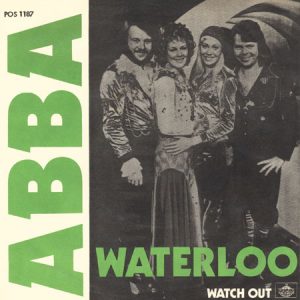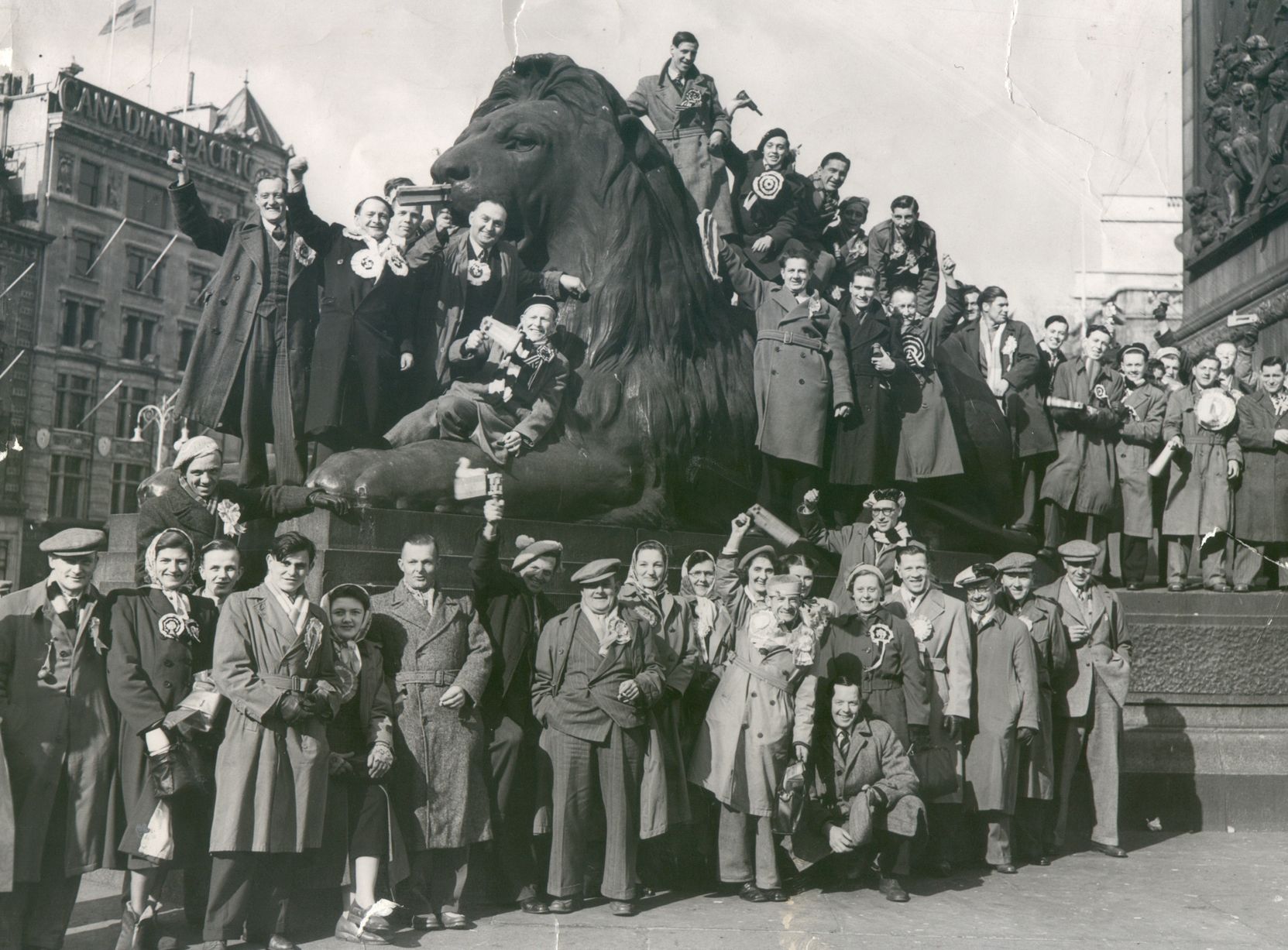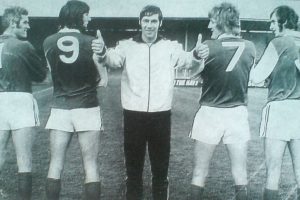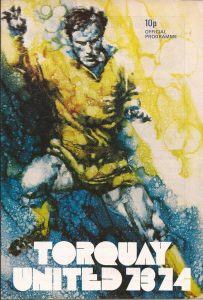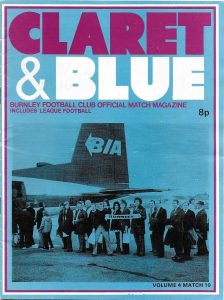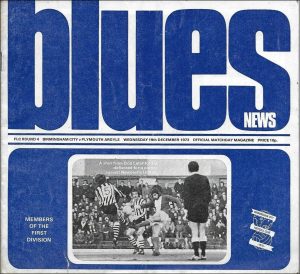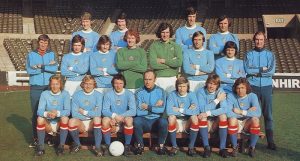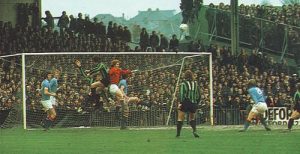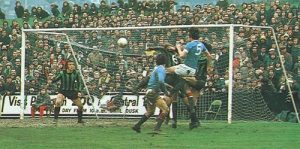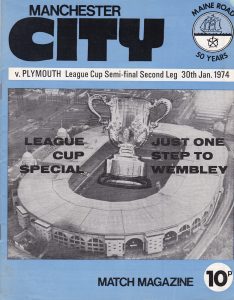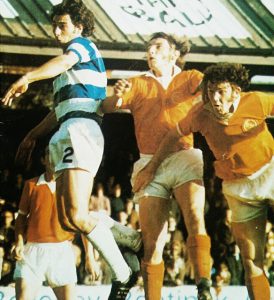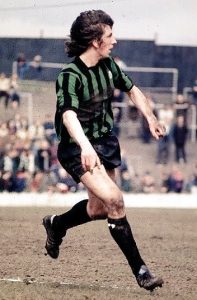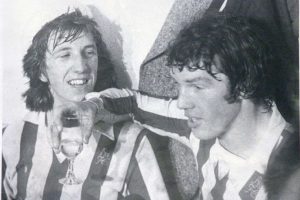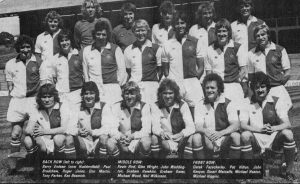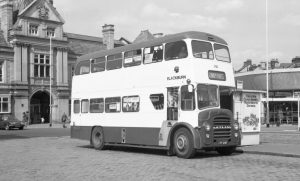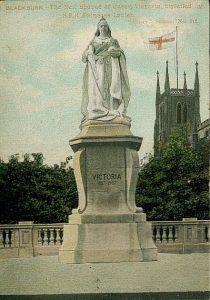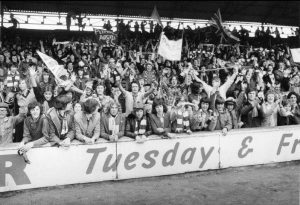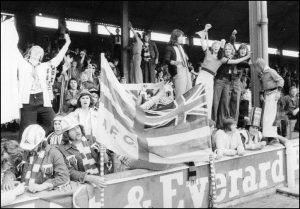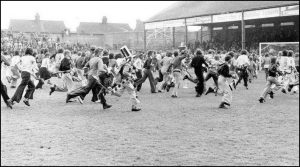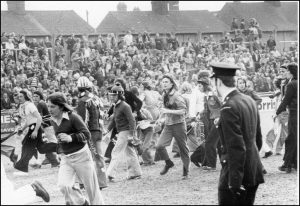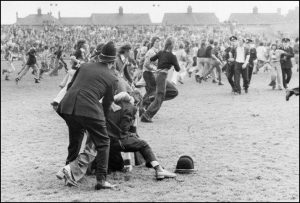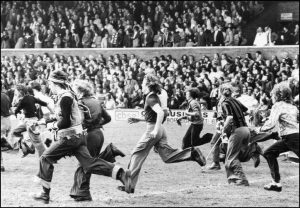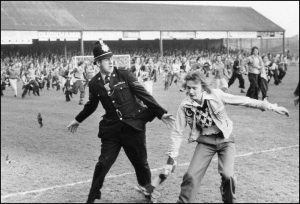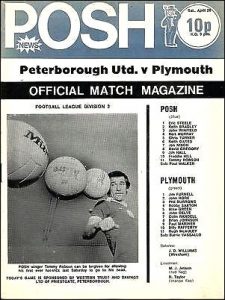
I feel like I win when I lose
The summer of 1974 is chiefly remembered for Richard Nixon’s resignation and the World Cup in West Germany. Political and sporting idealists were grimly unsurprised when neither appreciably altered the status quo – the catharsis of Watergate morphed into the mockery of Gerald Ford’s pardon, and Holland’s totaalvoetbal consumed its own smoke against the skilled but pragmatic Germans. in Britain, meanwhile, art imitated life when Abba’s Waterloo was replaced at the top of the charts by Ray Stevens’ innuendo classic The Streak. All in all it felt like a bad couple of months for the purists.
Total football probably didn’t feature in Tony Waiters’ planning for the new season. He was more bothered about his Plymouth team’s paradoxical form in 1973-74. It had been an eventful campaign during which they made national headlines and yet occupied a very lowly position in the Third Division. This was a matter of some concern to the 35 year-old, in his first managerial job after a playing career as a goalkeeper with Blackpool and Burnley. Waiters’ growing reputation as an FA and international youth coach had led Argyle to take a calculated risk on his obvious inexperience in July 1972. He joined a club becalmed in the lower divisions after being a solid member of Division Two for much of its history.
It says much about Waiters’ second season in charge that an impressive FA Cup performance at Old Trafford, in a game lost to a solitary Lou Macari goal, has largely been forgotten. It was the League Cup that would write the season’s headlines and yet Plymouth’s first victory in this competition, against Torquay in late August, was principally welcome as a distraction from moribund League form. Waiters reacted in characteristically decisive fashion and brought in three youngsters from the reserves – striker Paul Mariner, wingers Brian Johnson and Alan Rogers – leading to a flurry of goals. In the next round Ernie Machin’s midfield nous and a brace from Argyle stalwart Steve Davey saw Second Division Portsmouth leave Home Park on the wrong end of a 4-0 mauling.
Burnley were next and few expected much from a tough trip to First Division opposition. Their fears seemed realised as Ray Hankin shot the Clarets ahead in the first half of a game played in dense fog. But Plymouth equalised when Colin Waldron put through his own net and won it in extra time with a goal from centre-back Neil Hague. (“We had no idea he scored”, recalls one supporter. “We could just hear the moans of the Burnley fans.”) This set up another tricky away tie. QPR were one of the best sides in the country but an unstoppable Argyle performance blew them away. Wide man Alan Welsh was the hero with two spectacular goals, and the reliable Davey grabbed the third in a 3-0 win. “A mesmerising, incredible combination of blistering pace and glittering skills”, enthused Ray Head in the Western Morning News.
By now the energy crisis was beginning to bite. Birmingham City didn’t have their own electricity generator and so the next round at St Andrews was an inconvenient two o’clock midweek kick-off a few days before Christmas. Bob Hatton put the hosts in front early on, but – as at Turf Moor – Argyle dug in and scored two quick goals, Welsh with the leveller and then a stunning volley from Davey for 2-1. That was enough to seal a third away win on a First Division ground and secured a two-legged semi-final with Manchester City. The first of these games took place in front of 30,000 on a cold January afternoon at Home Park (the miners’ strike had added its own pressure to Heath’s three day week). The second was an evening match at Maine Road a week later.
Here are some memories from those who were there. These, and the other Argyle recollections in this article, are reproduced with thanks to pasoti.co.uk .
“Schools allowed us kids the time off so we could see the match. This helped swell the Wednesday afternoon attendance figure.”
“I took a half day off work for the game despite being told I couldn’t because ‘everybody wants to go’. I was suspended for five days and when I asked them to give me seven so I could go to Maine Road as well I was sacked.”
“I remember being driven to the match in my mate’s car and listening to the radio playing Radar Love by Golden Earring and You Ain’t Seen Nothing Yet by Bachman Turner Overdrive. I can never hear either of those again without it conjuring up memories of the Man City game.”
“I took an early pass out from work saying I had an emergency dental appointment. The following day my boss said ‘I see you went to the same dentist as me’. He was stood behind me in the Devonport End.”
“Many of the City players were quoted as saying it was one of the worst pitches they had played on, which is quite something as Maine Road was almost completely bereft of grass in the early 70s.”
“The first leg was a classic game of two halves. Argyle dominated the first half and the City keeper made some excellent saves to keep them in it, before their superior fitness took over in the second. It took a header from a corner by Booth to equalise. Some people seem to have struck it lucky being given time off school – it certainly wasn’t the case at Tavistock Comprehensive, but there were a whole load of absence notes being written that evening!”
“City were able to access their own generator to get the second leg played under floodlights.”
“For the second leg in Manchester I sorted a lift there with a meat wagon from Smithfield market but had to thumb it back.”
“This Cup run gave everyone a taste of travel, big games and large followings, so when the 74/75 season started the fans were all ready to follow the team in large numbers and show the country what a big club we were. It seemed that every pub or area of Plymouth would run coaches to the away games. In the Devonport End lads from Efford, Southway, Swilly, Devonport etc all stood together and of course travelled away together.”
City won the second leg 2-0 and ultimately lost the Final to Wolves. But Argyle had enjoyed a taste of the big time – and they wanted some more.
The fastest thing on two feet
And so back to Tony Waiters. It’s fair to assume striking options didn’t worry him that summer. Rogers and Welsh were quality wide men, young Mariner ended up with 14 goals, converted full-back Davey scored 19. And in March, with the new season in mind, Waiters had signed the talented but injury-prone Billy Rafferty from Blackpool. Despite succumbing to a recurring knee problem after five appearances he was fit again now and would partner Mariner, while Davey dropped into defence – for the time being. The big Devonian was soon on his way out of the club. He quarrelled with Waiters when with typical generosity, but much to the manager’s disapproval, Davey allowed Rafferty to complete a hat-trick against Tranmere by scoring a penalty he himself should have taken.
Paul Mariner started in non-League football. Scout Verdi Godwin – who discovered both Waiters and Emlyn Hughes while at Blackpool – spotted the 19 year-old turning out for Chorley in the Cheshire League. Mariner excelled for Plymouth during a 1973 pre-season tour of Cornwall and stood out as an exceptional footballer, athlete and finisher. His debut against Rochdale produced a first League goal. He went on to score in the Portsmouth match, play a significant role in the League Cup run and bag FA Cup winners against Brentford and Walsall. It’s hard to overstate Mariner’s practical and iconic significance for Argyle in this era. “Man of the match pretty much every time he appeared for us”, remembers one fan. “Often the best player on the pitch no matter what the score was or who we played.”
Although Rafferty was only three years older than Mariner he already had five League seasons under his belt, three of them at the top level. He too was strong in the air and played well with his back to goal. The two strikers formed a partnership based on hard work and their shared strengths – running at defences, holding the ball and making space for one another. “He had everything but there were still a few rough edges to him” recalls Rafferty of Mariner. “We hit it off very, very quickly.” Argyle embarked on a 16-game unbeaten run which propelled them to the top of the table. It ended on 25 January with a 3-1 FA Cup defeat to Everton that attracted 38,000 to Home Park. This was followed ten days later by the most important League match so far.
Second-placed Blackburn Rovers visited Plymouth on 4 February in equally good form. The match had been rearranged due to Cup commitments, and took place just a fortnight before the return fixture in Lancashire. Kick-off was delayed while another bumper attendance of over 28,000 packed into the ground. “I remember standing in the middle of the Devonport End, looking at the car headlights stretching away up Outland Road as the 7:30 kick off time came and went”, says Ian De-Lar. The raucous crowd went home happy. Rafferty scored his 17th of the season to put Argyle ahead, winger Brian Johnson doubled the lead and a late consolation goal for a lacklustre Blackburn side proved of no consequence at all.
4,000 hools in Blackburn, Lancashire
Argyle hadn’t lost in 18 league games by the time they arrived at Ewood Park. A win would take them clear at the top of the table and a travelling army of Plymouth’s finest bounced into town determined to throw their weight around. These fans turned Blackburn into Greenburn for a few anarchic hours before both the day and the game got away from them. Once the match started Plymouth led 2-0 early on with goals from Hugh McAuley and John Delve, and Rovers looked finished when Jim Furnell saved Don Martin’s penalty. But Ken Beamish pulled one back before the break and then Martin and Mike Hickman scored a brace each in the second half to complete a 5-2 thrashing.
These Blackburn memories are from brfcs.com .
“The Plymouth fans arrived very early morning. I think the law then stated that a coach driver had to have so much rest between the outbound and return journey. The Old Bill had asked for them to be dropped at Darwen Circus in the belief that they would float down to the ground and hang around for 5 or 6 hours. Of course they didn’t and clambered aboard buses into Blackburn.”
“I was working Saturdays in Woolies and would be first man there in the mornings when Rovers were at home, work 6.30 till 2.30 and get the bus to Ewood. Shortly after opening it was panic stations as people arriving for work described hordes of Argyle fans marauding around. The store was closed for a time as rumours spread of a large posse intent on looting and pillaging, and I think a window or two got smashed around town.”
“I recall seeing a photo in the Telegraph of the statue of Queen Victoria on the Boulevard painted green. For years after the remnants of PAFC spray painted on the route to Ewood were still there.”
“The Lancashire Evening Telegraph for that day, printed about 2-3pm, has on the front cover a graphic picture of a Rovers fan getting a kicking on the Boulevard. Manna from heaven for the editor 30 yards away in his office who would have despatched his snapper over the road to record the carnage.”
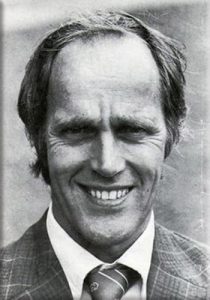
General Lee
“The match itself was fantastic. Watching Gordon Lee’s side when it cranked into gear was like watching a tank battalion crush the resistance into the mud.”
“Mike Hickman was star man for me that day, an absolute beast of a midfielder who wasn’t quick but opponents would bounce off him.”
“My abiding memory of the game was that Plymouth started off like a house on fire with Paul Mariner and Billy Rafferty giving us a hard time up front. We got more into the game after about half an hour. Second half I was stood on the Blackburn End watching wave after wave of Rovers attacks rain down on the Darwen End.”
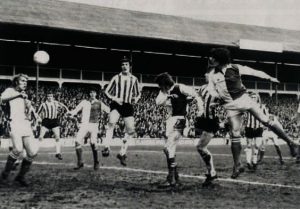
all three strikers scored
“We played a 4-3-3 system then with Beamish, Hickman (a central striker not a midfield player) and Don Martin up front with Metcalfe, Oates and Tony Parkes in midfield. The front three ran Plymouth ragged in the second half once the midfield had got a grip in the centre of the pitch. All three strikers scored as we took command of the game. We were very direct that day playing fast attacking football that Plymouth just couldn’t handle. They looked a very dispirited bunch at the end.”
“I vividly remember meeting my pal Brian off his bus from Great Harwood and walking along Bolton Road in pretty calm order. Think they had been rounded up and marched to the ground by then. Similar after, no trouble, just a huge crowd of jubilant Rovers fans heading back to town on foot.”
“The Green Army took us all by surprise, not only in the town but on the pitch, only for Rovers and their supporters to regain full and total control.”
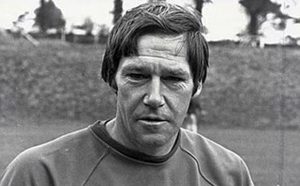
a long day (pafc.co.uk)
All in all it was a long day for the hordes from Devon:
“I remember being photographed in Blackburn by the local press around 10 am – they were just dumbfounded by the Argyle fans’ invasion so early in the day (travelling overnight was the reason).”
“I have to say the atmosphere at that game was unbelievable. The whole ground was electric and after we had let a two goal lead slip the Blackburn fans’ singing (on all three sides) left you speechless. There was no riposte. It was if the whole ground was vibrating – just amazing, and something that I will always remember.”
not the most glorious chapter
Plymouth were sufficiently shaken to lose two of their next four games, and this – combined with Blackburn embarking on a long unbeaten sequence – knocked them off the top of the league. So it remained going into the season’s last weekend. Both teams had already been promoted, and Argyle found themselves level with the leaders on points but marginally behind on goal average. To finish as champions they needed to get a result from the long trip to Peterborough and hope Rovers slipped up against Wrexham. Neither happened. The game ended in a 1-0 defeat, the title went to Lancashire and once more the Green Army started early. But today nothing and no-one would stop them…..
(These pictures were shared to pasoti.co.uk by Ian Newell, via Facebook.)
“I made friendships that season that have lasted to this day. We all still chat and re-tell the stories from those years – Charlton (Clockwork Orange), Stoke City (Watney Cup), Bournemouth (white boiler suits). Some great players, big crowds, mates, good music and fashion.”
“There was a fantastic run until the Everton FA Cup defeat and the crowds just flocked back to Home Park. Every match was an adventure with your mates at grounds we had never been to before, arriving at 7 or 8 in the morning and seeing so many Argyle fans wandering about waiting for the local pubs to open.”
“I was on a coach that left Bretonside around midnight and reached Peterborough about 7am.”
“Got there bladdered at 6am after drinking in the Breton Arms until midnight and then getting on the coach. What were the Peterborough police thinking of letting 60 coach loads of Argyle fans arrive at 6 in the morning for a 3pm kick off?”
“We went by train and were legless by Taunton. At Cheltenham the shout of ‘Quick, Bristol City fans’ resulted in mayhem. One was hijacked and pulled onto the train before it was found that the ‘City’ fans were in fact the Cheltenham Reds, an official Manchester United supporters club.”
“The town was a sea of green scarves (no replica shirts back then!) There were bouts of trouble breaking out everywhere that Saturday morning. Loads of Argyle fans got in for free after some gates were broken down. The crowd was reported as 11,000, of which probably 7,000 were Argyle supporters.”
“My first away game! I just could not believe what i was witnessing that day. Unbelievable scenes all day long. Tried at one stage to count the number of coaches that had parked up and I’m pretty sure my mate and I got to somewhere near 100 before we gave up.”
“Because of the early start there were considerable numbers of the Green Army milling around. Someone found an open door and we all duly trooped in. There we were, thinking that was easy and meant we had saved some money, when they informed us over the tannoy that if we didn’t leave the game would be called off.”
“I was one of those who walked in at about 12.30. Everyone trudged out when they announced that if we did not leave the game would not take place. Then about 20 minutes later even more rushed back into the ground. After a wander about and the same threat regarding the game we all left again.”
“When we returned at a more appropriate time some Argyle fans did decide to break in, and were charging a door when suddenly it opened and a load of police ran out and arrested the perpetrators.”
“The world’s strongest man, Geoff Capes, was a copper on duty at the game.”
“There was chaos outside the ground and I guess they decided to start letting Argyle fans in to try and calm the situation outside and in the town centre. They opened the turnstiles but I know many got in for nothing. I saw a side gate burst open and lots of fans run in, as well as others who climbed the walls.”
“By 30 minutes before kick off Argyle fans had already invaded the pitch twice.”
“The Peterborough fans only arrived about 20 minutes before kick off time. As soon as they sang their first song everyone just charged straight down the pitch and into the London Road End. This resulted in a massive scramble of Peterborough fans trying to get away and leave the ground.”
“I will never forget waiting at traffic lights to cross a road and watching a load of Argyle fans turn over a car load of Peterboro supporters, literally on to its roof. They didn’t move, they just sat there upside down.”
“At the start of the day everyone was good natured and up for the game. Didn’t take long for matters to change though and police had to be drafted in from all over to try and help. Gates got broken down twice and I believe the ref got hit by a bottle at the end of the game. Pubs and shops were ransacked, cars overturned and policemen were put in bins and rolled down a hill.”
“I went on the special train. Mad day out, arrived back at North Road and the platform was lined with Naval police. That toned us down a bit. Worse was that my Mum and Dad, having heard of trouble up there, met me and dragged me off home in front of my mates.”
“It was not the most glorious chapter in our history.”
